#Yasmin Nair
Explore tagged Tumblr posts
Text
I know it can get lost in the sheer audacity of that piece but "drug deal gone wrong" wasn't even the Defense's argument. They said it was a robbery gone wrong! Adding drugs to it is just blatant homophobic stereotyping.
22 notes
·
View notes
Text
I’ve heard from too many people that they felt pressured, especially as young and vulnerable new activists, to be particular kinds of sexual beings and made to feel less political simply because a particular sex scene wasn’t really their scene.
That needs to stop. The revolution will not come on the tidal wave of your next multiple orgasm had with your seven partners on the floor of your communal living space. It will only happen if you have an actual plan for destroying systems of oppression and exploitation.
Yasmin Nair, Your Sex Is Not Radical
4 notes
·
View notes
Text

The NYT Book Review Is Everything Book Criticism Shouldn't Be
0 notes
Text
𖣠͢🍎 ᬽ some name ideas ᭄ᬽ
jaedi , saerin, eren , ezra , saiko , jaylin , fleur , isaac , nakia , chadi , zoa , zia , nair , amir , nasir , faiz , dahlia , nadine , zayin , isaiah , elijah , kaito , kian , adelai , cain , yasmin , jericho , josiah , sarai , silas , zion , zeke , aaliyah , aisha , iyka , noya , layla , *brainfried*



#thanks for the req ❤︎#emoji combos#messy bios#messy moodboard#symbols#symbols combo#aesthetic#aesthetic bios#krp#krp theme#kpop#krp bios#krp moodboard#rp#kpop locs#kpop users#kpop bios#kpop layouts#dividers#riize#wonbin#locs#short locs#kpop aesthetic
201 notes
·
View notes
Text
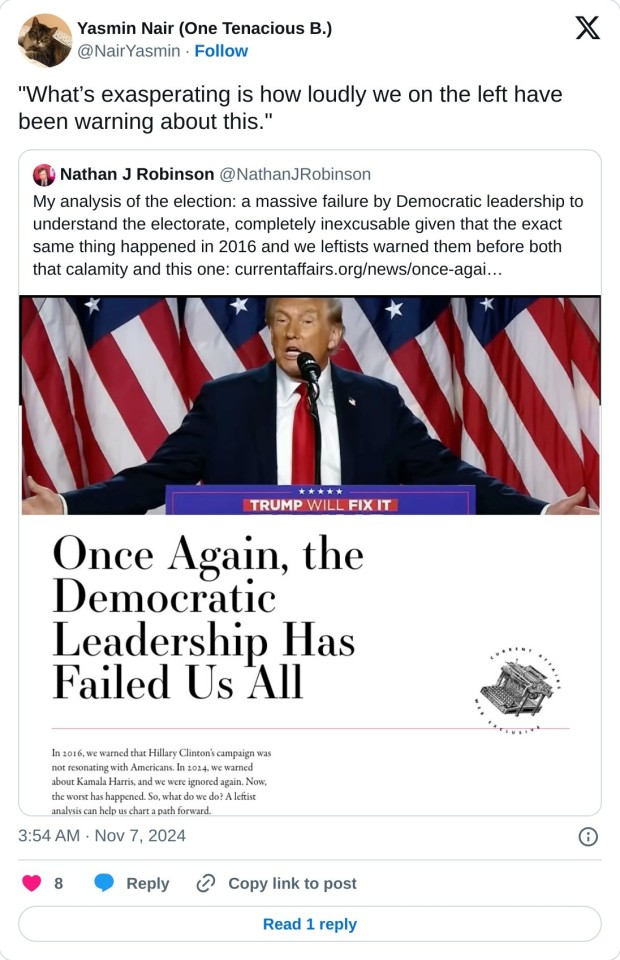
In August of this year, Current Affairs editor-at-large Yasmin Nair wrote a blog post with a confident title: “Kamala Harris Will Lose.” Nair warned that Harris was already repeating Hillary Clinton’s mistakes from 2016, such as running more on personal narrative and empty rhetoric than on a clear vision for how to transform the lives of struggling Americans. She warned that Democratic leaders were taking their base for granted by contemptuously refusing to accommodate any of the demands of the “Uncommitted” movement over the war in Gaza. Nair’s analysis looks remarkably prescient now that Harris has, in fact, lost.
Other writers made similar arguments here in the magazine. I argued, for instance, that Kamala Harris was worryingly focused on vibes and the parasocial aspect of politics, rather than on giving people a clear understanding of what exactly a Harris presidency would do for them. Harris made some very obvious blunders that revealed her to be a poor politician, such as her failure to come up with an answer when she was asked a (very obvious) question, namely how she would have governed differently than the unpopular incumbent, Joe Biden. Harris missed obvious opportunities to court voters, such as missing an opportunity to appear on the most popular podcast in the world, The Joe Rogan Experience. Rogan ultimately endorsed Trump, but his politics are malleable, and I very much suspected that a strong performance by Harris on the podcast could have won him over or at least kept him from publicly siding with Trump.
My colleague Alex Skopic and I warned in August that Harris was making a mistake by abandoning progressive policies like a jobs guarantee and Medicare For All. This is not just because we think these are good policies that will help people’s economic situations at a time when they see living costs as a hugely important issue. And it’s not just because the policies are popular. It’s also because ditching the policies made Harris look opportunistic and dishonest. It was clear she abandoned them because she holds the (deeply mistaken, in my view) position that progressive policies are destined to alienate centrist voters and hurt you electorally.

20 notes
·
View notes
Text
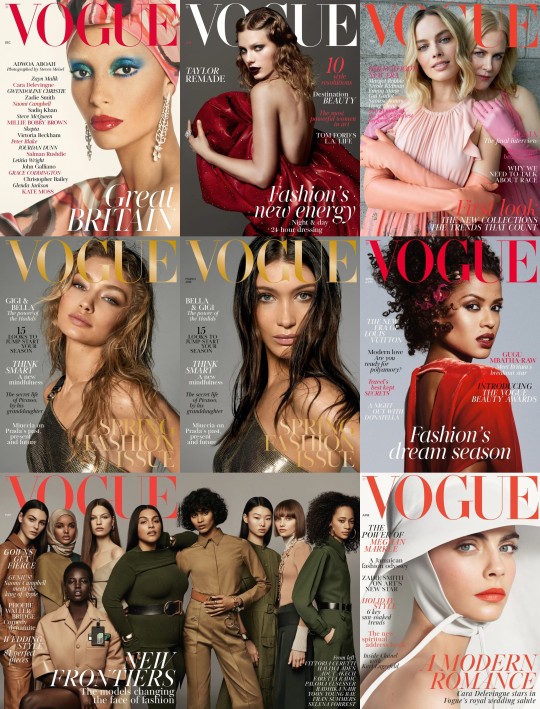

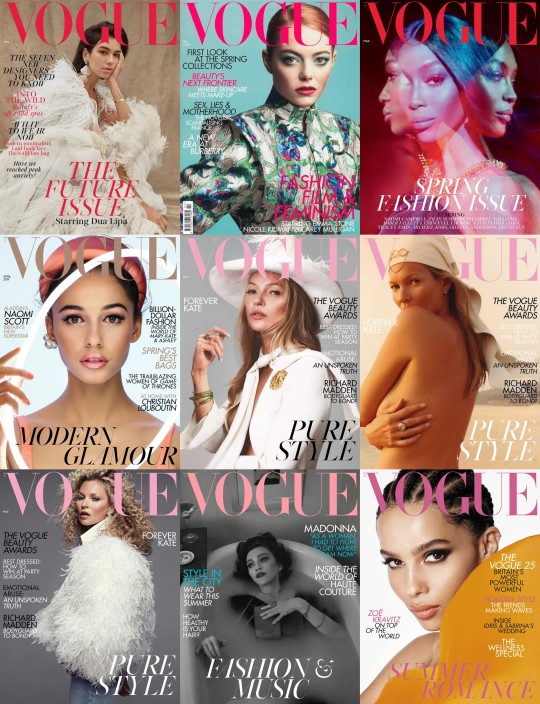

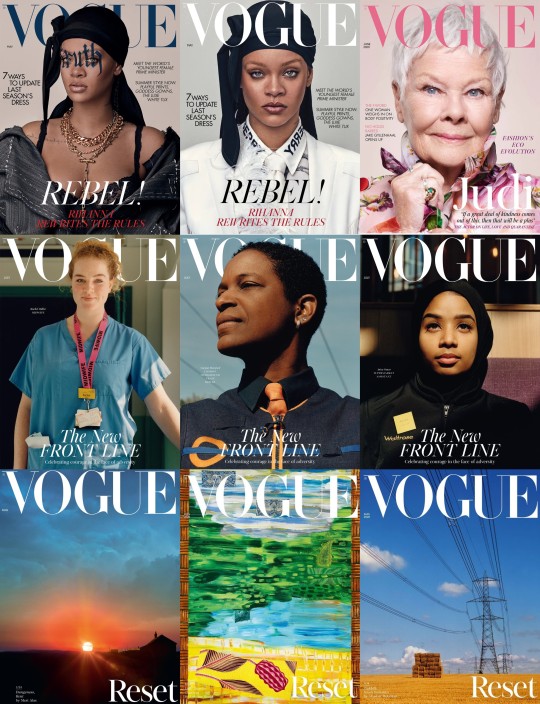

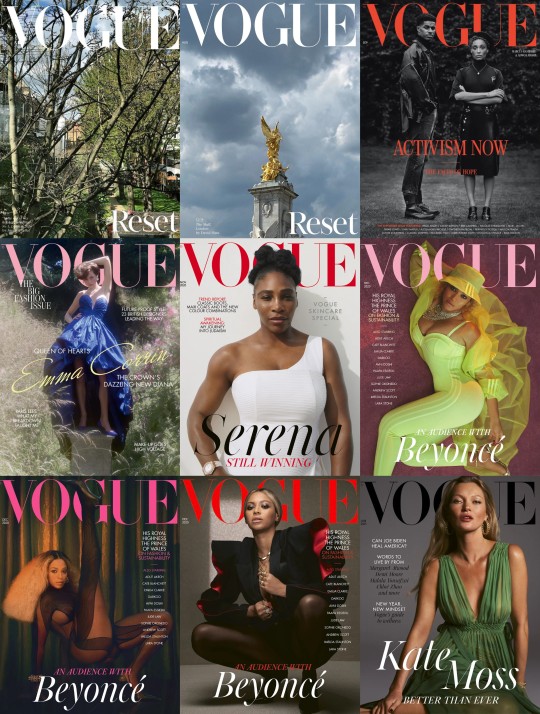

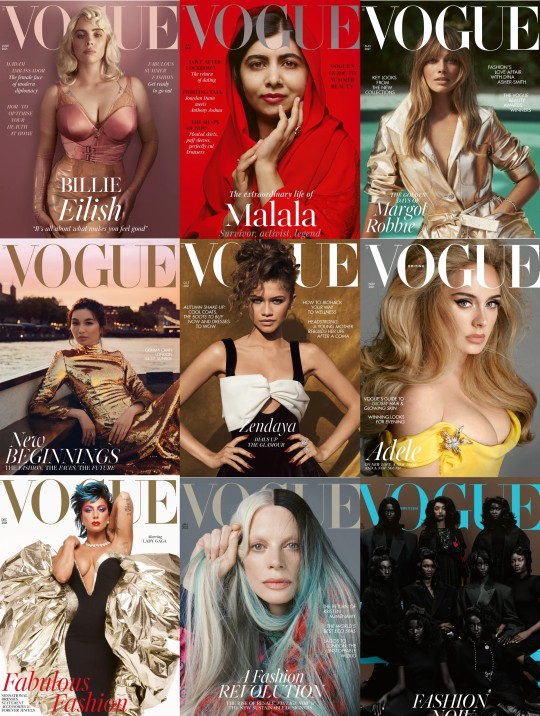
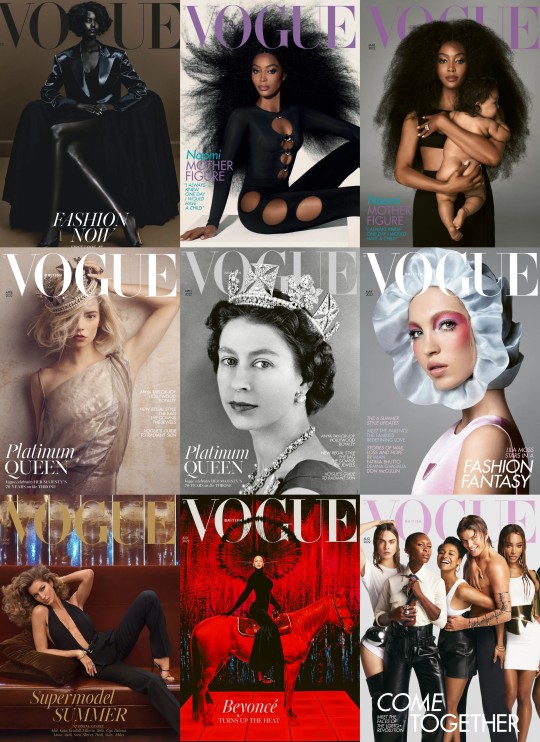
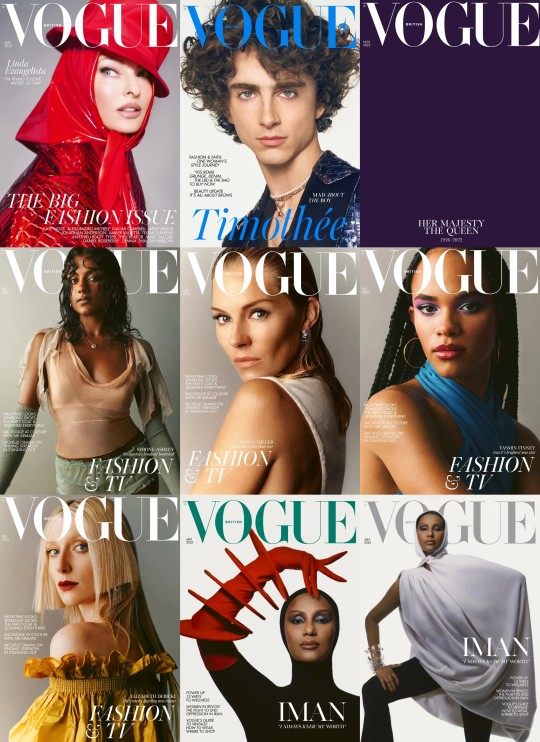
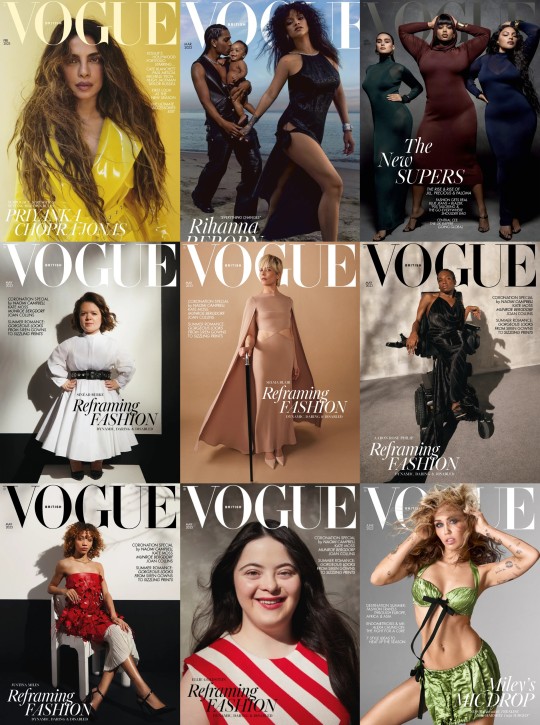
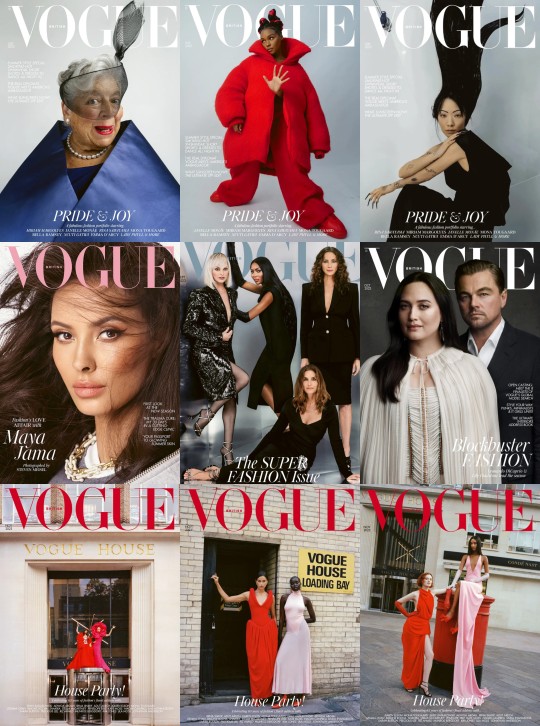
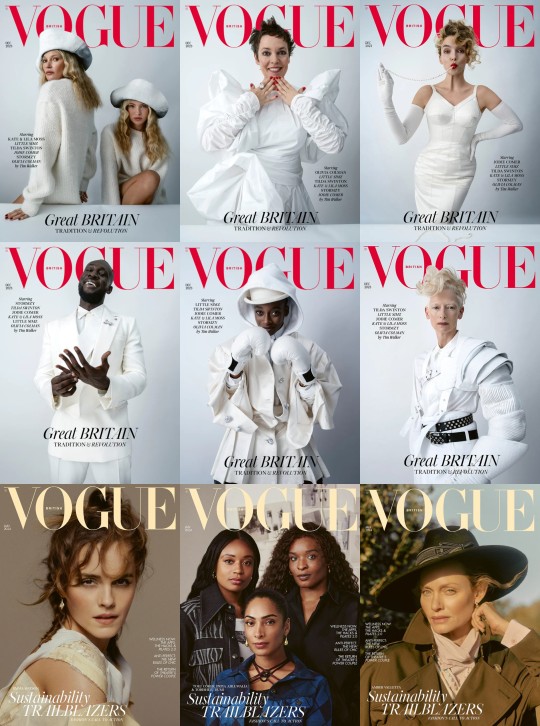
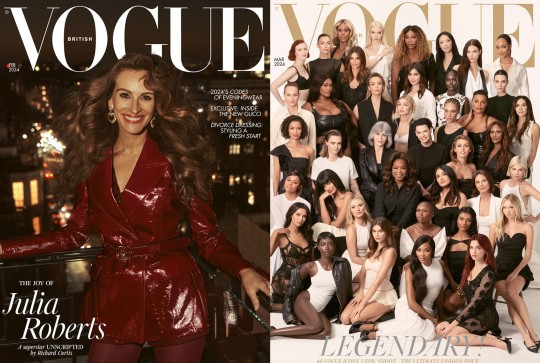
Edward Enninful's British Vogue (December 2017-March 2024)
December 2017: Adwoa Aboah by Steven Meisel
January 2018: Taylor Swift by Mert & Marcus
February 2018: Margot Robbie & Nicole Kidman by Juergen Teller
March 2018: Gigi Hadid & Bella Hadid by Steven Meisel
April 2018: Gugu Mbatha-Raw by Mikael Jansson
May 2018: Vittoria Ceretti, Halima Aden, Adut Akech, Faretta Radic, Paloma Elsesser, Radhika Nair, Yoon Young Bae, Fran Summers & Selena Forrest by Craig McDean
June 2018: Cara Delevinge by Steven Meisel
July 2018: Ariana Grande by Craig McDean
August 2018: Oprah Winfrey by Mert & Marcus
September 2018: Rihanna by Nick Knight
October 2018: The Beckham's by Mikael Jansson
November 2018: Fran Summers by Inez and Vinoodh
December 2018: Stella Tennant, Adut Akech, Primrose Archer & Saffron Vadher by Steven Meisel
January 2019: Dua Lipa by Nadine Ijewere
February 2019: Emma Stone by Craig McDean
March 2019: Naomi Campbell by Steven Meisel
April 2019: Naomi Scott by Nick Knight
May 2019: Kate Moss by Mikael Jansson, Jamie Hawkesworth & Inez & Vinoodh
June 2019: Madonna by Mert & Marcus
July 2019: Zoë Kravitz by Steven Meisel
August 2019: Karlie Kloss by Steven Meisel
September 2019: Adut Akech, Gemma Chan, Greta Thunberg, Jameela Jamil, Chimamanda Ngozi Adichie, Adwoa Aboah, Jacinda Ardern, Francesca Hayward, Ramla Ali, Christy Turlington, Salma Hayek, Sinéad Burke, Jane Fonda, Laverne Cox & Yara Shahidi by Peter Lindbergh
October 2019: Kaia Gerber by Steven Meisel
November 2019: Jourdan Dunn by Nick Knight
December 2019: Emma Watson by Alasdair McLellan
January 2020: Taylor Swift by Craig McDean
February 2020: Lupita Nyong’o by Steven Meisel
March 2020: Irina Shayk by Mert & Marcus
April 2020: Jodie Comer by Steven Meisel
May 2020: Rihanna by Steven Klein
June 2020: Judi Dench by Nick Knight
July 2020: Rachel Millar, Narguis Horsford & Anisa Omar by Jamie Hawkesworth
August 2020: Reset by Mert Alas, Lubaina Himi, Alasdair McDean, Craig McDean, Nadine Ijewere, Nick Knight, David Hockney, David Bailey, Martin Parr, Marcus Piggot, Jamie Hawkesworth, Tim Walker, Juergen Teller & David Sims
September 2020: Marcus Rashford & Adwoa Aboah by Misan Harriman
October 2020: Emma Corrin by Charlotte Wales
November 2020: Serena Williams by Zoë Ghertner
December 2020: Beyoncé by Kennedi Carter
January 2021: Kate Moss by Mert & Marcus
February 2021: Dua Lipa by Emma Summerton
March 2021: Angelina Jolie by Craig McDean
April 2021: Janaye Furman, Precious Lee, Mona Tougaard & Achenrin Madit by Steven Meisel
May 2021: Thandiwe Newton by Mikael Jansson
June 2021: Billie Eilish by Craig McDean
July 2021: Malala Yousafzai by Nick Knight
August 2021: Margot Robbie by Lachlan Bailey
September 2021: Gemma Chan by Hanna Moon
October 2021: Zendaya by Craig McDean
November 2021: Adele by Steven Meisel
December 2021: Lady Gaga by Steven Meisel
January 2022: Kristen McMenamy by Steven Meisel
February 2022: Amar Akway, Majesty Amare, Akon Changkou, Nyagua Ruea, Abény Nhial, Maty Fall, Janet Jumbo, Adut Akech & Anok Yai by Rafael Pavarotti
March 2022: Naomi Campbell by Steven Meisel
April 2022: Anya Taylor-Joy by Craig McDean & Queen Elizabeth ll by Antony Armstrong-Jones
May 2022: Lila Moss by Steven Meisel
June 2022: Gisele Bündchen by Steven Meisel
July 2022: Beyoncé by Rafael Pavarotti
August 2022: Cara Delevingne, Cynthia Erivo, Ariana DeBose, Jordan Barrett & Munroe Bergdorf by Mert & Marcus
September 2022: Linda Evangelista by Steven Meisel
October 2022: Timothée Chalamet by Steven Meisel
November 2022: Her Majesty Queen Elizabeth II Tribute
December 2022: Simone Ashley, Senna Miller, Yasmin Finney & Elizabeth Debicki by Scot Trindle
January 2023: Iman by Nadine Ijewere
February 2023: Priyanka Chopra Jonas by Zoë Ghertner
March 2023: Rihanna, A$AP Rocky & son by Inez & Vinoodh
April 2023: Jill Kortleve, Precious Lee & Paloma Elsesser by Inez & Vinoodh
May 2023: Sinéad Burke, Selma Blair, Aaron Rose Philip, Justina Miles & Ellie Goldstein by Adama Jalloh
June 2023: Miley Cyrus by Steven Meisel
July 2023: Miriam Margolyes, Janelle Monae & Rina Sawayama by Tim Walker
August 2023: Maya Jama by Steven Meisel
September 2023: Linda Evangelista, Naomi Campbell, Cindy Crawford & Christy Turlington by Rafael Pavarotti
October 2023: Lily Gladstone & Leonardo DiCaprio by Craig McDean
November 2023: Emily Ratajokwski, Adwoa Aboah , Irina Shayk, Adut Akech, Karen Elson & Mona Tougaard by Sean Thomas
December 2023: Kate Moss,Lila Moss, Olivia Colman, Jodie Comer, Stormzy, Little Simz & Tilda Swinton by Tim Walker
January 2024: Emma Watson, Tolu Coker, Priya Ahluwalia Torishéju Dumi & Amber Valletta by Charlote Wales
February 2024: Julia Roberts by Lachlan Bailey
March 2024: Karen Elson, Irina Shayk, Laverne Cox, Anya Taylor-Joy, Serena Williams, Rina Sawayama, Karlie Kloss, Jourdan Dunn, Amber Valletta, Precious Lee, Cindy Crawford, Jodie Comer, Gemma Chan, Adut Akech, Vittoria Ceretti, Gugu Mbatha-Raw, Cara Delevingne, Jane Fonda, Gigi Hadid, Linda Evangelista, Adwoa Aboah, Miley Cyrus, Paloma Elsesser, Iman, Victoria Beckham, Ariana DeBose, Jameela Jamil, Oprah Winfrey, Salma Hayek, Christy Turlington, Selma Blair, Maya Jama, Anok Yai, Kate Moss, Kaia Gerber, Cynthia Erivo, Naomi Campbell, Simone Ashley, Dua Lip & Lila Moss by Steven Meisel
48 notes
·
View notes
Text
For the most part, it is very good advice to take people at their word. If somebody says they're bisexual believe they're bisexual. But sometimes people will say the words I'm bisexual in order to get some sort of cachet they associate with being LGBT, maybe they want cool points. Maybe they want to be homophobic and get away with it. One point in their favor is at least they bothered to actually say an LGBT identity. There are a lot of people who are just like, being queer is non-normative in any capacity I'm not normative in some capacity therefore I'm queer and my opinion matters just as much if not significantly more then like real gay people. I call that one Yasmin Nairing
8 notes
·
View notes
Text
i just think that yasmin nair would be better off yelling at some old queens in boystown than trying to act like chasten buttigieg writing a memoir is the death of gay activism and the erasure of a complex history
8 notes
·
View notes
Text
curious what yasmin nair was saying on twitter after reading all that and i am genuinely not american enough to parse this but

saying white-passing gay women are among the people running chicago 'like a plantation' strikes me as. hm.

genuinely, what does this even mean? "gatekeepers" --doesn't that mean keeping people out? how are women keeping gatekeeping gay men's misogyny? My native language is not english but the definition really doesn't just seem to include "protect from the backlash against" which is what she seems to mean? what does any of this even mean?
what she seems to be saying is that women protect gay men from accusations of misogyny... I think? not sure. She seems to think the elite of chicago is entirely comprised of white (and white passing!) gay men and women who oppress everyone else, and in order to maintain their position women protect misogynist and racist gay men specifically, not just men in general. I don't know enough about the US to dispute this but it seems so unlikely? That gay men are especially influential and protected in comparison to regular old cishet ones i mean.
#for the record these are genuine questions. this sure READS are hostile wordsalad to me#but i have quite simply never even been on her continent.
6 notes
·
View notes
Text
Everything I learn about Yasmin Nair is against my will.
3 notes
·
View notes
Text
Good stuff I read lately
This Is Not an Escape Story: At 15, Darlene Stubbs walked away from a polygamous cult—then discovered a new life and community through running. Paige Kaptuch, Runner's World. Will never not read an article about escaping a cult.
How to Be Critical of the Things You Love, Nawal Arjini, The Nation. Attention fans of Neil Gaiman and Alice Munro.
The Last Rave: In the summer of 2020, I felt as if I’d entered the wrong portal, out of the world I knew and into its bizarro twin. Emily Witt, The New Yorker (archive link). Are the editors at The Cut kicking themselves that they didn't get this article or do they specialize in very bad relationships that don't end with a break up?
My Childhood in a Cult: On our isolated commune, we kids were taught that the world was about to end. But my world ended when I was told to leave. Guinevere Turner, The New Yorker (archive link). More cult content, this one about a cult I've never heard of and is still going.
At 12 my parents married me to a man 31 years older than me AMA, anonymous Reddit AMA. What an incredibly brave woman. There's no minimum age for marriage in California so long as the parents approve, a law that enables and conceals the abuse of children and women.
How a Twitter war in 2010 helped change the way we talk about women’s writing: The surprisingly long ripple effect of the Jennifer Weiner-Jonathan Franzen feud. Constance Grady, Vox. Big props to Jennifer Weiner for speaking up - it looks like the conversation she started has actually resulted in change in book reviews. And Franzen remains the most overrated author I've read.
The NYT Book Review Is Everything Book Criticism Shouldn't Be: The Review is famous as an arbiter of taste and quality. But the publication utterly fails to seriously engage with books and the publishing industry. Yasmin Nair, Current Affairs. Or maybe there's a lot more change needed.
The Abalone Capital of the World: By the middle of the twentieth century, Morro Bay was the biggest source of abalone destined for the dinner plate in the United States. Glenn Silloway, Historical Society of Morro Bay. I found a piece of abalone shell at the beach. Growing up, Josh learned they were extinct in Morro Bay but not quite. Someday I'd like to try it.
0 notes
Text
Young Women's Empowerment Project pg. 127
YWEP - The Young Women’s Empowerment Project
A former affiliate of INCITE! that operated at a fractal level and focused on one-on-one interactions and youth groups involved in sex trades and street economies. The organization constantly practices adapting skills, interests, and experiences, for the needs of the individual members involved in changing political, economic, and social conditions. Their work is rooted in “liberatory harm reduction,” which operates at a fractal level making their work:
Organic
Location Dependent
Condition Dependent
Using resilience-building practices operated in a transformative justice framework, coining the phrase “resilience and resistance.”
YWEP’s work was unique to the people, relationships, places, and conditions they faced and shaped. Their former co-director Shira Hassan shares that they could only share how they did it because it can be used as information for others to create their own version because there will never be a replicable model.
Chaz Bono speaks at HBHC panel by Yasmin Nair, Windy City Times
0 notes
Note
fun fact (actually infuriating fact), hatred and discrimination towards pit bulls is actually deeply intertwined with anti blackness and racism!
per yasmin nair's article "racism and the american pit bull" (which is a review of bronwen dickey's book pit bull: the battle over an american icon, which i have not read):
In the 20th century, the 1970s witnessed the swift and precipitous decline of modern cities. As America’s urban areas struggled, poorer residents, often Latino and Black, came to depend on pit bulls, which were an affordable means of receiving protection and companionship. The media vilification of pit bulls soon followed. Dickey suggests that the creation of the 24-hours news cycle, inaugurated by CNN in 1980, represented a turning point. The rise of cable television created a salacious interest in “ghetto” and “thug” stories, and the news networks loved to report on the viciousness of urban “animals” both canine and human. A July 1987 Sports Illustrated story about pit bulls featured a cover illustration of the dog snarling, open-mouthed, with fangs on full display. The title in large print and all caps: “BEWARE OF THIS DOG.” During this time, at the height of the Drug War, the media similarly stigmatized Latino and Black men. They were treated as toxic carriers of drug addiction and social dysfunction, much as rats and other animals have been cast as sources of disease. The link made between savage beasts or dangerous animals and black humans is as old as the history of enslavement. As the actor Michael B. Jordan memorably phrased it: “Black males, we are America’s pit bull. We’re labeled vicious, inhumane, and left to die on the street.” (Jordan made the comment in a promotional interview for the film Fruitvale Station, in which he played Oscar Grant. Grant was an Oakland resident fatally shot by transit police, in a killing that anti-police brutality activists have described as an execution, and proof that black lives in America are treated as expendable.) [x]
you should read nair's full article, which goes into a lot of the different dynamics at play, but a few other key things to note:
there is actually no one breed that makes up a "pit bull", but they are still the most likely to be subject to breed-specific legislation
there's a complex history between black communities in the united states and dogs, especially dogs who were historically used to hunt people escaping enslavement and then by law enforcement, as well as the way black people have been dehumanized in comparison to animals - but also many black folks, even those who were enslaved, had good relationships with dogs! it's complicated
many of the reports of pit bull attacks did not even involve pit bulls; breed discrimination is so prevalent that even a golden retriever involved in attacking a human could be labeled a pit bull
i think it's also important to name that much of the effort to "reclaim" and de-stigmatize pit bulls does so (whether intentionally or not) by reframing pit bull owners as white and middle-class - see "pit bull moms" - which can reinforce the anti blackness. we should be fighting both that anti blackness and breed discrimination together.
Do you know what the consensus on pit bulls is? Some people say the negative stereotypes surrounding them are unfair, while others insist they’re inherently dangerous dogs that shouldn’t be kept as pets. Both views are biased to some degree, so I don’t know which to believe.
they're just. dogs.
and same as german shepards, same as huskies, same as dalmations, they have specific breed requirements and aren't right for every home! also like all dogs, they have to be trained to be a reliable and safe pet. but with their needs met and good training, they're about the same as any other dog in their size range (with individual exceptions for personal history and trauma of course)
13K notes
·
View notes
Text
If we cannot understand the horrors of war, poverty, illness, and assault of any kind in the abstract, surely that speaks to a depravity in our public life. If we cannot imagine what suffering feels like without making someone perform it for us over and over again, surely it’s we who are the most inhumane and cruel, more so than those who inflicted the abuse in the first place, because we insist that the suffering become permanent public displays? What does it mean for the world we want if we cannot fight for the rights and dignity of other humans, without first making them cry for us and without us crying over them?
Yasmin Nair, from “AOC and the Weaponisation of Trauma”
#politics#mine#Yasmin Nair#AOC#to attempt a continental analogy: it´s the very same Greeks ( and other Europeans I presume) who#gluttonously devour the trauma of refugees and high-five themselves for their humanistic reflexes#yet deem refugees unworthy of their funds the very moment they see a Syrian woman with a manicure or say Afghan teens dancing on Tik Tok#ή για τους φίλους της υψηλής κουλτούρας- το Βικακε να ψοφάει να ακούσει το προσωπικό δράμα του κάθε Ηρακλή#φαίνεται ότι έχεις βασανιστεί ΠΕΣ ΜΑΣ ΟΤΙ ΕΧΕΙΣ
723 notes
·
View notes
Text
The idea, too popular among historians and commentators and the public at large, that queer life is only truly queer once it escapes rural areas is part of a larger cultural perception that non-urban areas simply don’t matter and don’t deserve resources. We can consider the vibrancy of non-urban life without fetishizing it as more authentic (or more adorable). And, in considering it as equally if differently vibrant, we might begin to slow the material depredations that non-urban areas in the U.S in particular have seen for so long, including the loss of basic infrastructure like public transportation (try taking an hour-long bus trip to the only gay bar in a small town on a cold December night: desire dies fast in the freezing air) and much-needed healthcare (if you’re trans and/or queer and need LGBT-sensitive healthcare, your only choice sometimes is to take a days-long trip to the nearest large city, and that’s if you’re lucky). Over the last many decades, we have naturalized the idea that the most significant resources (or the resources that get us, literally, to the places we want to get to) need only be portioned out to urban areas because, after all, who lives anywhere else?
Yasmin Nair, “Forget Stonewall”
11 notes
·
View notes
Link
There are a lot of brilliant parts of this critical review of Hannah Gadsby’s work by Yasmin Nair. In the following excerpt, Nair rightfully calls attention to one of the problematic ways in which Gadsby critiques Picasso:
It’s Picasso’s relationship to his lover Marie-Thérèse Walter that most incites Gadsby’s rage and fury. Gadsby’s anger is marked by the sort of moralizing that seems more fit for an arch-conservative—she spits out the fact that he was married, horrors, with a Bible-thumper’s scorn for infidelity. Her contention that he had “sex with an underage girl” makes it seem like Picasso had raped a child. In a strictly legal sense, though, even putting aside all the issues we might have with the law’s definition of “underage,” this is not actually true. In France, what we might call the age of consent was 13 in 1947, when the two met, and it is now 15 (although, as with all things French, the matter is...complicated). In Australia, where Netflix filmed Nanette, the age is either 16 or 17, depending on where you are. In the United States, the legal age for sex ranges from 16 to 18.
Putting aside the historical inaccuracy of Gadsby’s comment about sex with “underage” women (and acknowledging that not all intergenerational sex is unproblematic): it’s really fucking weird to see a queer person be so invested in arbitrary distinctions between legal and illegal sexual behaviors. Gadsby herself points out, early in Nanette, that homosexuality was against the law until 1997 in Tasmania, that she grew up knowing that 70 percent of Tasmanians believed that homosexuality was wrong, and that she had internalized that logic. Certainly, the combination of internalized homophobia and shame is a deadly problem that afflicts millions of queer people, and we cannot expect everyone, especially the young and vulnerable, to magically turn into Queer Superheroes who dismantle such violent impositions of sexuality with a copy of Gender Trouble and a sassy flick of the wrist. But the idea that laws about sexuality are only created to keep an entire population in fear is literally the foundation of her entire show: she traces her own abuse, her sense of a lack of self-worth back to that legal construction of illegality.
Gays and lesbians have, historically, been hounded, “treated,” demonized, brutalized, and even killed precisely because “laws” everywhere, including those defining sexual consent, have sought to demarcate their bodies and actions as illegal. Given this history, the sight of a lesbian—an urbane, cosmopolitan, adult lesbian who is surely not unaware of critical approaches to sex and the law, or with the long history of queer resistance to such laws, so vociferously (and incorrectly, even in the legal sense) denouncing sex between a man and a woman is incongruous and disheartening. Gadsby makes much of the self-hatred she felt as a result of knowing that the vast majority of Tasmanians hated people like her—but she fails to understand (or willfully refuses to see) how laws don’t emerge from reality but create and shape it. One would think that someone so concerned with laws determining legality and illegality on the axes of gender and sexuality, and how wrong they are would at least question the idea of an “underage girl.”
There’s a lot going on here that follows more clearly in the context of the whole article, but I really appreciate this particular deconstruction because it speaks to the frenzied moral panic that white and western/ized people have about the arbitrarily-marked ‘age of consent.’ Rather than actually attending to the nuances of consent and development (keeping in mind that norms around ‘maturity’ and ‘development’ are also based in ableist and otherwise oppressive structural frameworks), even other groups like queer people, who have been so subject to the moralizing logics of cisheteropatriarchy, are all too ready to balk at intergenerational relationships. (To be clear, as Nair is being, of course these kinds of relationships can be abusive, as can any relationships, but to treat that as a given based on a legal marker is problematic.) There are legitimate critiques of Picasso, but this (along with most of the rest of Gadsby’s critique, including her erasure of women Cubist artists) is really not.
(As a corollary, it’s also just very frustrating to see 16-19 year olds or whatever treated as if they are ‘babies,’ a common tendency I see in current queer discourse. I also see this extended to all people under 25! Really maddening and deeply problematic for any conception of youth rights.)
#yasmin nair#hannah gadsby#nanette#intergenerational relationships#age differences#liberalism#assimilation
1 note
·
View note